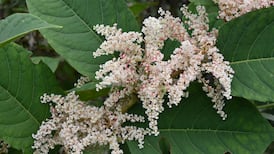I’ve recently discovered that lots of young vegetable seedlings in my allotment have been uprooted. I suspect it may be birds. Any tips on how to stop them? Shauna C, Dublin
Unfortunately, this is often a problem for kitchen gardeners at this time of year and can quickly result in a lot of damage. The most common offenders are blackbirds, thrushes, pigeons and members of the crow family. Once upon a time the recommended solution was to create a cat’s cradle of twine or thread criss-crossed over the seedlings as a deterrent, but this runs the risk of accidentally entangling and injuring any visiting birds. Ultrasonic bird deterrents that use noise at a pitch imperceptible to human ears are also available, but are by no means a nature-friendly solution.
A far better alternative is to cover your seedlings with fleece, garden netting or failing that, a fine gauge chicken wire, all of which can be very effective but do need to be monitored twice daily (once in the morning, then again in the evening) to make sure that birds haven’t accidentally got caught beneath them.
Traditional bird scarers such as old CDs or DVDs hung from short sticks can also help to deter them, as can bamboo canes stuck into the ground close by. Other gardeners have also had success with using garden chimes, but these aren’t to everybody’s taste so perhaps check with your fellow allotment holders first to see if there are any objections.
READ MORE

The good news is that it’s usually only a short-lived problem that will soon disappear as your seedlings get bigger. But if it becomes a persistent issue, then consider raising young plants in modules under cover of a cold frame or polytunnel so that they’re already quite sturdy young transplants by the time you plant them out.
Not only will this technique help to protect them against possible bird damage, but it also makes them less vulnerable to damage from slugs and snail as well as more resilient in the face of unfavourable growing conditions.
















